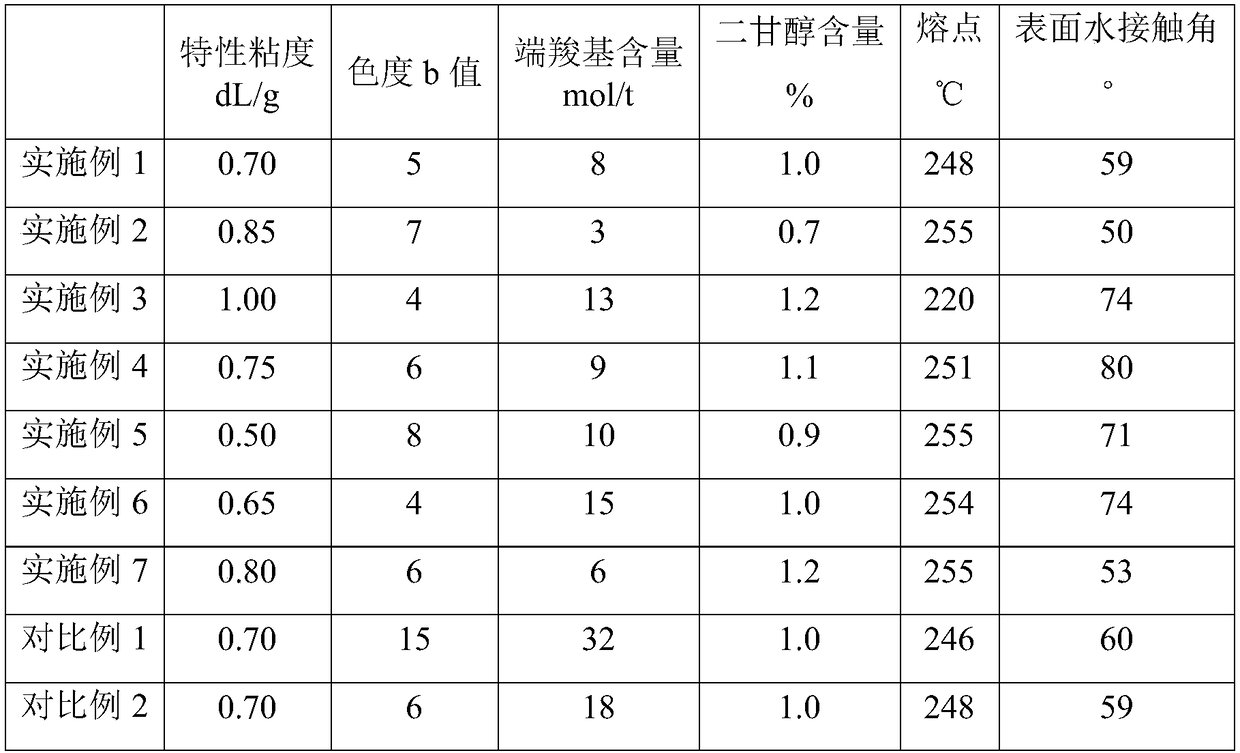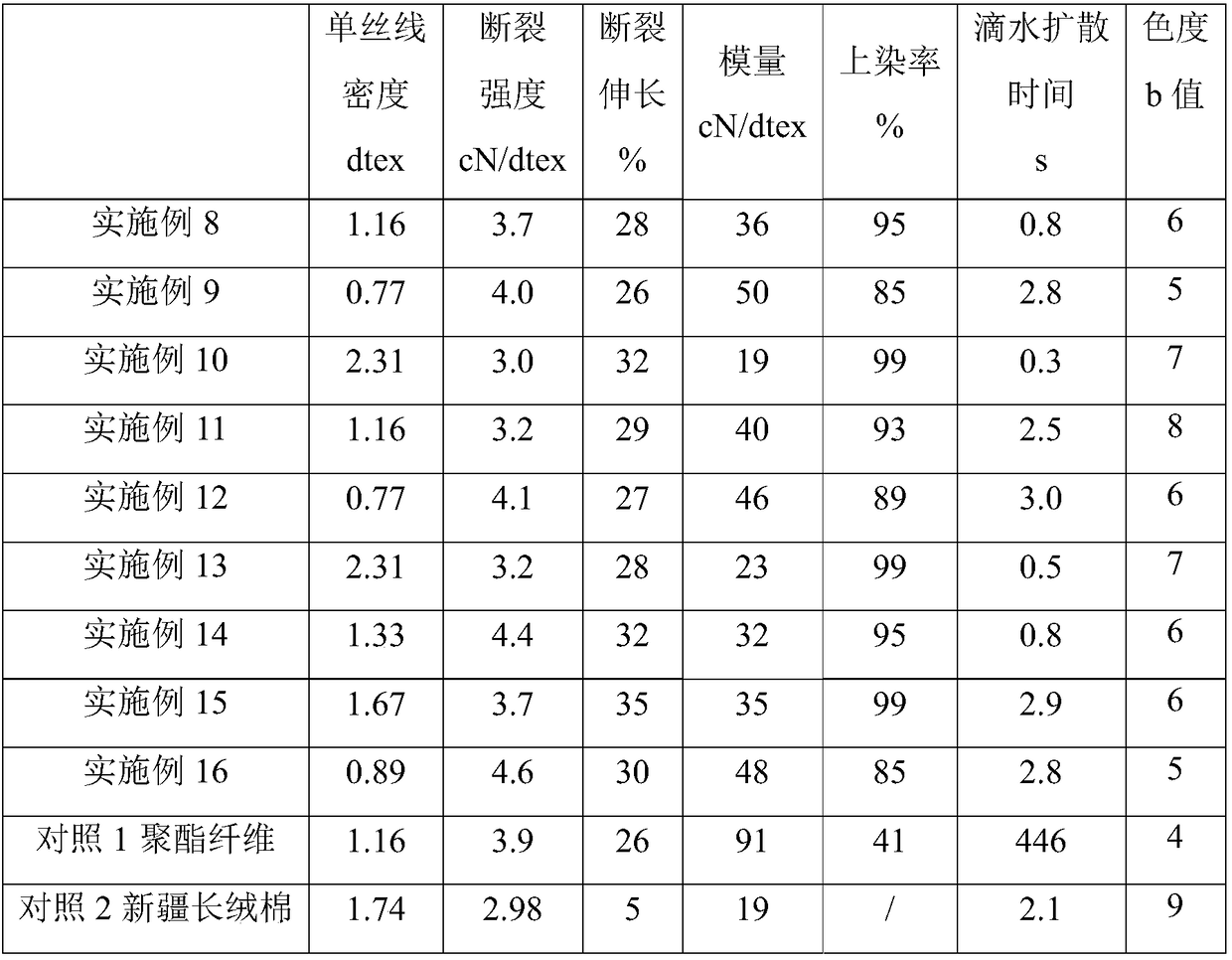Hydrophilic polyester fiber and preparation method thereof
A polyester fiber and hydrophilic technology, applied in the field of textile fibers, can solve problems affecting production stability, dripping, plugging holes, etc., and achieve the effect of smooth spinning process, overcoming yellowing, and excellent hue
- Summary
- Abstract
- Description
- Claims
- Application Information
AI Technical Summary
Problems solved by technology
Method used
Image
Examples
Embodiment 1
[0073] (1) Terephthalic acid and ethylene glycol are prepared into a slurry according to a molar ratio of 1:1.15;
[0074] (2) The slurry prepared in step (1) is continuously added to the esterification system composed of the first vertical esterification kettle and the second vertical esterification kettle for esterification reaction, and the first esterification kettle reacts The temperature is 260°C, the reaction pressure is 500kPa, the reaction temperature of the second esterification tank is 265°C, and the reaction pressure is 120kPa. When the degree of polymerization of the ethylene terephthalate oligomer reaches 5, the ethylene terephthalate Glycol ester oligomers are continuously and stably withdrawn from the esterification tank through the oligomer pump;
[0075] (3) The ethylene terephthalate oligomer prepared in step (2) is adjusted to 235° C. through a heat exchanger, and then polyethylene glycol and dipentaerythritol / bis( 2,4-di-p-isopropylphenyl)pentaerythritol ...
Embodiment 2
[0080] (1) Terephthalic acid and ethylene glycol are prepared into a slurry according to a molar ratio of 1:1.05;
[0081] (2) The slurry prepared in step (1) is continuously added to the esterification system composed of the first vertical esterification kettle and the second vertical esterification kettle for esterification reaction, and the first esterification kettle reacts The temperature is 275°C, the reaction pressure is 400kPa, the reaction temperature of the second esterification tank is 275°C, and the reaction pressure is 200kPa. When the polymerization degree of the ethylene terephthalate oligomer reaches 8, the oligomer is passed through the low The polymer pump is continuously and stably withdrawn from the esterification tank;
[0082] (3) The ethylene terephthalate oligomer prepared in step (2) is adjusted to 250° C. through a heat exchanger, and then mixed with polyethylene glycol and pentaerythritol / tri[2.4 with a molecular weight of 8000 added online. -Di-t...
Embodiment 3
[0087] (1) Terephthalic acid and ethylene glycol are prepared into a slurry according to a molar ratio of 1:2.0;
[0088] (2) The slurry prepared in the step (1) is continuously added to the esterification system composed of a vertical esterification tank for esterification reaction. The reaction temperature of the esterification tank is 240 ° C and the reaction pressure is 100 kPa. When the degree of polymerization of the ethylene glycol phthalate oligomer reaches 1, the oligomer is continuously and stably extracted from the esterification kettle by the oligomer pump;
[0089] (3) The ethylene terephthalate oligomer prepared in step (2) is adjusted to 200° C. through a heat exchanger, and then mixed with polyethylene glycol and glycerol / ethylene glycol with a molecular weight of 200 added online. Triphenyl phosphate / N,N'-bis-(3-(3,5-di-tert-butyl-4-hydroxyphenyl)propionyl)hexamethylenediamine / cobalt acetate / tetraethyl titanate The alcohol solution is mixed uniformly by a tub...
PUM
 Login to View More
Login to View More Abstract
Description
Claims
Application Information
 Login to View More
Login to View More - R&D
- Intellectual Property
- Life Sciences
- Materials
- Tech Scout
- Unparalleled Data Quality
- Higher Quality Content
- 60% Fewer Hallucinations
Browse by: Latest US Patents, China's latest patents, Technical Efficacy Thesaurus, Application Domain, Technology Topic, Popular Technical Reports.
© 2025 PatSnap. All rights reserved.Legal|Privacy policy|Modern Slavery Act Transparency Statement|Sitemap|About US| Contact US: help@patsnap.com



